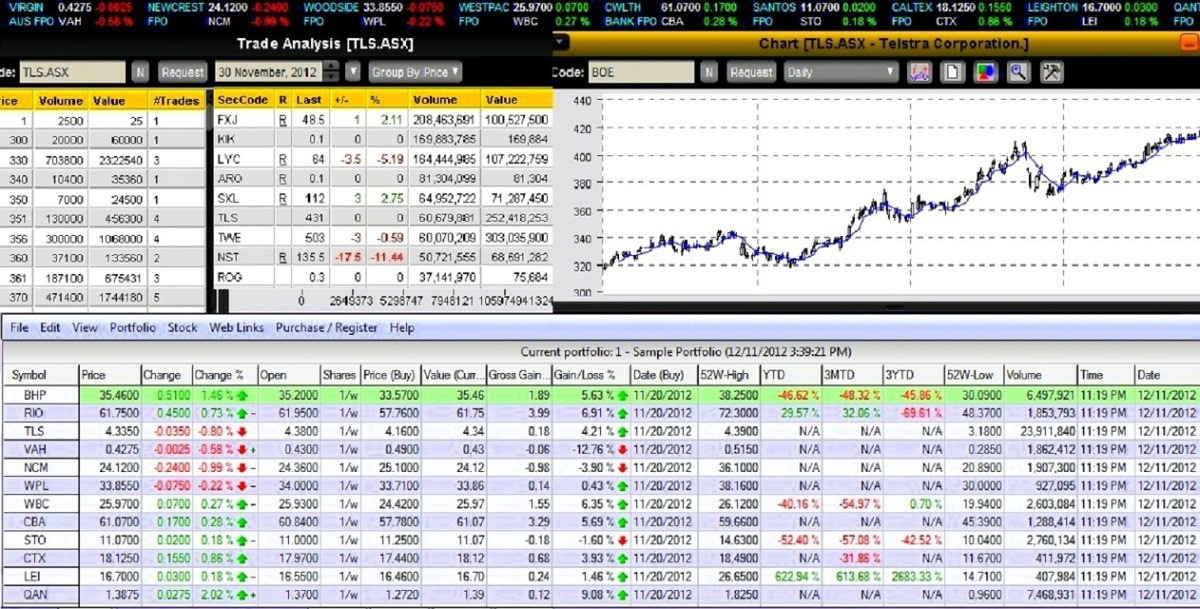So You Want To Be An eBay Consignment Seller?
(Or how I got to Here from There)
A consignment seller is someone who is willing to sell, for a commission, something owned by another person. The seller does the work and generally earns a portion of the proceeds. There are a lot more details, so keep reading -- if were really this simple, more people would be doing it!

My Journey from eBay newbie to Consignment Seller
(or How I Actually Got Here From There - the abridged version)
First things first -- this is not a definitive guide to selling super stardom. Following exactly in my footsteps is not likely to gain you anything except the ability to walk exactly as I do... and that ain't always pretty.
This article is meant to be a narrative, humorous if I'm lucky, informative if I do well, of my journey from simple buyer to consignment seller. And while my journey played out on eBay, the lessons learned apply to any online venue. I'll share some of my better decisions and some of my more interesting mistakes.
I cannot tell you if consignment selling is for you - only you can determine that. What I can do is try to relate some of what I went thru on my journey. Your journey is sure to be different, but that's the best part!
So pull up a chair (what? you're already sitting? Good!) and relax... because in the words of that really wise person who's name I can't recall: What A Long Strange Trip It's Been!

Starting out as a newbie
(or Just What Is This eBay Thing Anyway?)
My online experiences started in high school in the mid 70's, continued thru college and into my first career as an IT Consultant. Then came The Internet and everything started to change.
Buying and selling online was nothing new - I'd been doing it on various BBS networks for years, buying new(er) parts for the PCs I was building and selling off the parts I didn't need. When the Internet first showed up, I really didn't pay that much attention - I was quite happy where I was!
Then someone told me about this new trading site called EBAY - said you could find some pretty good deals there. So, along with needing to be able to look up documentation for all the old(er) components I was buying, I thought it was about time to give this Internet thing a try.
1997 saw me finally creating a permanent ID on eBay - my earlier IDs got lost in the shuffle thru various ISPs. What I found was a great place to buy all kinds of things - not just PC stuff, but collectibles as well, stuff from way back when I was a kid!

You wanna buy WHAT???
(or How I Learned To Fund My eBay Addiction)
That simple entry into eBay was the start. I started buying a great many interesting things... and soon my wife noticed the missing funds in the family checkbook. Yeah...not good.
From that point on, any BUYing on eBay had to be funded only with the proceeds of my SELLing on eBay. My wife figured this would be a good way to clear out a lot of my "stuff" (I'm an incurable pack rat). Boy was she wrong.
What I soon discovered were two things:
#1 - I had a knack for selling. I may not have always gotten top dollar, but I did better than average at getting things sold.
#2 - There were other people who had things to sell that would pay me to sell their stuff!
Put the two together and it's easy to see where I was headed... straight into consignment sales. I started out selling accumulated PC parts from my own supplies, then selling parts for my employer. Programmer by day, consignment seller by night -- and I loved it!
Where Do You Find Stuff To Sell? - (or How To Look At Things A Little Differently)
- Around The House. #1 suggestion for new sellers is to sell what you have laying around the house (and no, ladies, that does NOT include your spouse!). Reason being - it's paid for, you know all about it, and it's likely not being used.
- Yard Sales/Garage Sales. Great source for inexpensive items. Some sellers will tell you to get their early and get the 'best stuff', others say wait and make an offer on everything that's left. You're the one with the cash and desire -- YOU decide which sounds best to you!
- Current Employer. This is not for everyone, but if you work for a small company (where you know the owner, his wife, kids, and dog), you might be able to help them out with clearing out excess inventory on eBay. Do your research first and keep the boss appraised.
- Storage Unit Auctions. Know what happens to your 'stuff' in that self-lock storage unit if you don't pay your rent long enough? They auction it off to the highest bidder! And while I wouldn't recommend bidding on your own abandoned stuff, Storage Unit auctions can be an interesting way to get a lot of 'stuff' cheap.
- Buy bulk lots on eBay and resell individually. If you know what you are doing, this can work. If you are just guessing, you can lose your shirt. Watch your total incoming cost (purchase price, shipping, etc) and make sure you can reasonably resell. This doesn't always work, but it's always interesting! :)
- Estate Sales. There have been reports of eBay sellers making great finds at estate sales, buying large lots of items and reselling them on eBay or elsewhere. This can be a bit tricky - you will need to know what it is you are buying, so you don't end up owning a rag-tag collection of reproduction dolls when you were sure they were antiques! If you've got the time, patience, and cash - give it a go and see if this works for you too!
- Small local manufacturers. Nearly every part of the country will have local manufacturers. Some are for common items that are simply cheaper to product locally than to ship all over the country -- not exactly what you are looking for. Others are manufacturers who have found a niche and are working it... and you can help them work eBay as well!
- Local service companies. Service companies are sometimes stuck with the goods they serviced when their customer cannot or will not pay for the services performed. After a reasonable period of time, the service company would like to get rid of this "inventory", recovering at least the costs of the services performed, and perhaps a bit more. This is an opportunity for the experienced seller to source quality product! What is a service company -- any company that accepts customer goods, performs a service on those goods, and then awaits payment by the customer. Think a bit and you'll start getting the idea. :)
So where's the good stuff - the mistakes and goof-ups?
(or Not Every Sale Is A Good Sale, Not Every Client A Winner)
Along the way I learned a few things:
Keep Your Inventory Firmly In Hand. Several lucrative contracts slipped away because I did not get the client to a) sign the contract and b) turn over the inventory. One contract I sorely miss was three pallets of HP laser printer cartridges. With an MSRP of around $150, and a "sell these for $50" client request, I was pretty sure these were going to be a winner. When I came back to pick them up, they were gone!! The owner, my potential client, had gotten a better offer from someone else and shipped everything out!! A possible $1500 commission for me... gone... just like that!
Lesson: Get that contract signed, and while the contract may allow the owner to cancel the deal, there should be an early termination fee to cover your time and expenses.
Not Everything Will Sell. I have a collection of 'stuff' that needs to be just given away - items that were consigned for sale and never did... and then the clients don't want them back. Now, I could just throw them out, but the 'green' part of me has a problem with that. So eventually they will end up on FreeCycle and find new homes elsewhere.
Lesson: Define what will happen to the items consigned up front, as part of the contract, and secure a Listing Fee Deposit if you have even an inkling of a feeling that these items may not sell.
Your Clients Don't Know Value. If you are going to be selling for consumers rather than businesses, be prepared to spend a good deal of time explaining how eBay works, how final prices are arrived at, and why not everything listing on eBay sells for thousands of dollars. Aunt Gertrude's soup bowl may be a family heirloom, but to the rest of the world is just a chipped, well used, common ceramic bowl. Not Everything Sells.
Lesson: The eBay buyers set the selling price, not you, not your client. Client expectations can be way out of line with reality, so learn to do some quick completed item searches for comparable items and prices.
Going Professional
(or How I Signed My Biggest Client)
One big lesson to learn: inventory to be sold can be found in the most unlikely of places.
At the start of 2003, I was a newly laid off IT Consultant, collecting unemployment, and trying to figure out how to go from Part Time to Full Time selling. Sounds easy... but it's not. Sourcing inventory is almost a full time job in and of itself!
Late 2003 I got a call from a gentleman who wanted me to sell some personal electronics for him - an old computer, a stereo, a component cassette deck... stuff like that. I almost blew him off - there was nothing in the list that would generate any real big sale, and since I was paid commission on the selling price, big items paid better than 'the small stuff'.
Then that little voice in the back of my head made a very good point: "Just what the heck else are you doing right now that's so important?" Not having a good answer, and always fearful of the voices in my head, I made the arrangements to meet with this caller and contract to sell his stuff.
Meeting day comes and I'm cooling my heels in his 'waiting area'. I'm in this big, older warehouse - interesting place, but no good magazines. Just stuff about shoes and footwear. Boring stuff.
As the receptionist takes me back to a conference room, we pass his office door and I notice he's the VP of Distribution and probably the one person in charge of the whole joint! Yikes!! I can deal with managers - 25 yrs as an IT consultant and I'd gotten pretty good at that. But VP's were always a bit more... intimidating. These people didn't work for someone... the someones worked for them!
Looking around the conference room, I see a layout for a new warehouse, more footwear magazines, and other shoe-related stuff. I'm starting to get a feel for what these folks do....
"Can you really sell shoes on eBay?"
(or How Keen Observation Can Close A Deal)
We had a nice conversation about how eBay works (educating your clients is a big part of being a consignment seller - separating myth from reality for your client), how I worked, what the fees would be and who would be paying them - the whole nine yards. As we were wrapping up, I handed him a copy of my standard consignment contract (every seller needs one!) and mentioned that there were definitions of terms on the last two pages.
He asked if I needed him to sign the contract -- I told him that for these few items, a handshake would do (TN still recognizes 'gentlemans agreement' contracts), but that if I were to start selling for his company, that we'd have to look at a contract more seriously.
You could literally see the light bulb turning on!
He'd never considered selling his company's inventory on eBay! He asked if I thought I could sell shoes on eBay... was there a market? I smiled... one of my 'students' (I did and still do help new sellers "learn the ropes") had gone from selling 40prs of shoes a month to selling 15-20prs a DAY! Yes, there most definitely was a market for shoes on eBay!
A bit more conversation and we headed out to take a quick tour of the warehouse. He explained that the layout I'd seen was for a new warehouse they were soon to be moving into - they'd outgrown their current space. In fact, they'd outgrown the new space and were negotiating for more before they'd even moved in!
Then he showed me the problem he needed resolved: a stack of assorted shoes, new in box. Odds-n-ends, overstock -- an accumulation of inventory that would eventually either be shredded or donated to local charities. They dealt in LARGE orders - these odds-n-ends were just getting in the way. So the question was, did I think I could sell them?
I ended up leaving with over a dozen pair of mostly New Balance ladies athletic shoes (the one brand I recognized) and selling them all that very week. Within a month I was picking up new stock weekly, within two months I'd reached Bronze PowerSeller status ($1000/month average product sales over the prior 3 months).
So where does all this leave me?
(or Where I Am Today And Where I'm Looking For Tomorrow)
Over the course of the next couple of years, I reach Silver ($3000/mo average) and then Gold ($10,000/mo average) PowerSeller status. My sales continued to climb, my client continued to supply more and more stock, and my buyers continued to be very pleased.
All because I took my time to learn about selling on eBay, learned to sell for others, and happened to put a few things together and opened my mouth about selling for a client's company. (I should note here that "opening my mouth" also led to contributing to multiple eBay-related books, magazine articles, online interviews, and even a spot in a local TV new broadcast on work-at-home opportunities. Speaking up can be a good thing!)
Inventory can be found in the most interesting places. Look around... what do you see that might make for interesting eBay sales? Have you checked it out? Why not? What the heck else are you doing that more important? :)
Key Points To Remember: - (or Things You'd Better Think About Before They Bite You!)
- Your clients will expect their agent (you) to know eBay. Experience is the only teacher for that -- sell, sell, and sell some more. Learn your craft before you try to sell your services.
- You will be part educator, part appraiser, part warehouse person, part salesperson, and totally overworked. You don't need to be an expert at everything, but you do need to be familiar with all of it.
- You don't need to start Full Time. I started selling part time for years before I started full time. Give yourself time to learn, and time to build your feedback.
- Find a mentor, or better yet, a group of mentors. I like the eBay Discussion Boards for this - and have participated as a regular poster in several for just that reason. Check them out... but read first (a lot!) and only post once you get a sense of the nature of the board (all serious, friendly, or just so-so).
- Learn to do your research. There are dozens of tools out there - find the ones you like and learn to use them. Knowing the odds going in improves your odds of coming out a winner.
- Keep an eye on your numbers. Not paying attention to your real costs can quickly turn what you thought was a profitable month into an overall loss. Know what you are spending, and what you are spending it on. "You make your profits when you buy, you collect them when you sell" - author unknown.
- Be Happy. Nobody goes into business to be miserable. If you are not satisfied, perhaps this is the wrong business for you. Which doesn't mean every day is a party... but if you have to drag yourself to the office every day, you'd be more suitably employed working at a 'regular job' where your taxes are paid, you accrue paid vacation, and you can put money into a 401K retirement plan.
Do I need a Contract?
(or: How Can I Be Sure To Get Paid And That This Is All Legit And Stuff?)
One of the most common questions from new eBay sellers, after "where can I find stuff to sell" is "Do I need a contract to sell for others?"
The Short Answer is "Maybe".
The Long Answer is "It Depends".
Here's what I've learned over the years, and how it applies to being a consignment seller:
- Most folks are honest. They're not out to rip you off or get you in trouble. They just want to get a good price for their stuff, as quickly as possible, with as little hassle as possible.
- People hear what they want to hear. If you have children, you know how this works - but for the rest of you: You're clients will stop listening when they think they have heard enough. This is not good, since it means they are quite likely to miss all the 'special terms' designed to keep you in the black.
- People will forget what they heard that they didn't want to hear. You could explain a rather simple point several times and still have your client come back just a few days later not understanding why you are doing what you are doing.
- Judges want to see things in writing, dated, and signed by both parties. And if it comes right down to it, a judge may very well hold your annual profits in the palm of their hand... so let's make sure what they are holding is your contract and not some scribbled notes from your disgruntled client!
AVOID VERBAL ORDERS/INSTRUCTIONS/CONTRACTS!
Some states still recognize a 'gentleman's agreement' as a binding contract, but that's no reason NOT to have a contract. Put it in writing. Black and white. Simple words. They do this, you do that. They get this, you get that. If they do this, you have the right to do this other thing.
Your contract should cover at least:
- The names of both parties. Company name and address is good. Identify one party as the consignor, the other is the consignee. I always get them confused... which is why it's spelled out in my contract! :)
- Spell out handling of the money - who gets what, who pays what, and when things happen. Define this clearly up front and stick to it! Some clients may be very laid-back about the spare change you generate for them... but you will need to account for it with the IRS.
- "Cherry Picking" is a term indicating the selective removal of the best items from a large lot. Don't let your client do it without a little something for your efforts. If you receive a huge box of mixed product, spend 1/2 day sorting and categorizing, only to have your client remove the best of the product... shouldn't you be paid for your work and the revenue they just snatched away?
- Who's possesses the product and who is responsible for it. I highly recommend you accept possession of the property to be sold and keep it under your own lock and key. This helps keep things from turning up missing when it's time to ship! This also means you will be responsible for it's safe-keeping... so get insurance on your consigned inventory. You may not experience theft from your garage... but what if that tree slams thru the roof and everything inside is soaked overnight by rain?
You can likely find a good consignment boilerplate (basic contract outline) online from any of a dozen places - but be sure to have it reviewed and approved by a local, licensed professional - in this case, a lawyer. Fees paid for professional services are generally deductible against income, and having a professional vet your terms, and suggest a few things you may have forgotten, can help keep a good year from turning into just another string of losses. Nothing ruins a good profit better than a poorly executed contract.
And remember, contracts can be amended - if you come to a new agreement with your client that would require a modification to the terms of the contract, do so. Write down the change in terms, have both parties sign and date it, and keep the original in your files with a copy going to your client for their files. Simple, and it helps avoid confusion.
Want to check out more of my articles about eBay? - (or: Is This Guy Never Going To Shut Up?)
- My eBay ToolBox
eBay selling can be serious work, and serious work requires tools. If you are going to grow beyond just casual selling, you need a toolbox with tools you know, trust, and can count on. Let me show you a few of my favorite tools... - Confessions of an eBay PowerSeller
Ever wonder if you could become an eBay PowerSeller - listing things for sale so people from all over the country or all over the world can buy them and have joy in their life, perhaps for the first time in years? I did... - Let eBay Do Your Shopping For You!
Ever have that hankering for that 'special item' that you see only once in a while on eBay... but you don't want to be tied up doing searches day after day after day? Don't you wish there was a better way to find what you wanted without having to sea
Books I'd recommend to future consignment sellers - (or Where Can I Read More About It?)
If you really want to know the ins-n-outs of eBay consignment selling, check out these books. All of them are part of my personal reference library, and they each contain much valuable information to help you learn more about consignment selling and running your own business. And remember, a lot of what you learn on eBay will translate to other online venues as well.
So what do you think? Interesting? Boring? A great read... or a real snoozer? Something I missed or something you'd like to know more about? I need your feedback folks - no one works well in a vacuum! :) Tell me what you think! Please?
© 2007 TN Grand Dad










